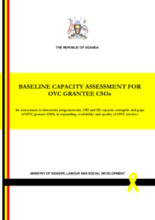The capacity assessment exercise was planned and conducted by the Communities Responding to the HIV/AIDS Epidemic (CORE Initiative) Uganda. The CORE Initiative program is funded by USAID and aims at expanding targeted services for youth and providing critical services for Orphans and other Vulnerable Children (OVC) in Uganda. Program activities are implemented through civil society partners (NGOs, FBOs and CBOs) in an effort to strengthen public-private sector partnership and improve service delivery. The International HIV/AIDS Alliance (IHAA) as a partner responsible for provision of capacity building support to MGLSD and partner CSOs led the capacity assessment exercise.
The capacity assessment approach is based on facilitating a self-critical reflection on issues and questions affecting organizations at various levels. The methodology works with CSOs utilizing participatory tools to examine existing strengths and gaps across a range of capacity areas and identifying priority areas to be strengthened. The process of capacity assessment enables organizations to establish where they are, draw lessons and strategize to do things differently for change and improvement. Commitment to addressing emerging capacity gaps which is essential for ownership is generated through a broad participation of policy makers, management and staff of CSOs assessed. Ownership is also ensured through an assessment process that emphasizes self-identification and prioritization of capacity strengths and gaps/needs without external influences and impositions.
The capacity assessment with 8 OVC CSOs was conducted by the Technical Advisor Capacity Building (CORE Initiative) between November 2005 and January 2006. The CSOs assessed operate in a total of 28 districts and implement OVC activities in three technical intervention areas namely: integration of HIV/AIDS prevention care and support services into one or more core program areas (CPAs) in underserved districts; assisting MGLSD in strengthening Child Protection services; and strengthening the capacity of civil society organizations (national non- governmental organizations, faith based organizations, and community based organizations) to plan, provide, manage and sustain OVC services.
The assessment methodology involved conducting facilitated participatory workshops with individual OVC CSOs for a period of 1-2 days. The workshops were attended by representatives of Board, management and staff of the CSOs assessed. The workshops were guided by a “CSO Capacity Analysis Tool” developed by CORE Initiative (Uganda). The tool examined three broad capacity areas namely: capacity for quality service delivery, organizational capacity and institutional capacity. For each specific capacity area assessed, participants individually scored performance of their organization on a scale of 1-4. Participants in groups generated group scores and stipulated the basis for scoring. Based on group scores and qualitative discussions, key capacity strengths and gaps/needs for individual CSOs were identified and prioritized.
Key strategies of OVC CSOs assessed included training, service delivery, provision of psychosocial support and rights based approaches to child protection. A summary of the key findings from the capacity assessment with OVC CSOs is included.
©Uganda Ministry of Gender, Labour and Social Development

